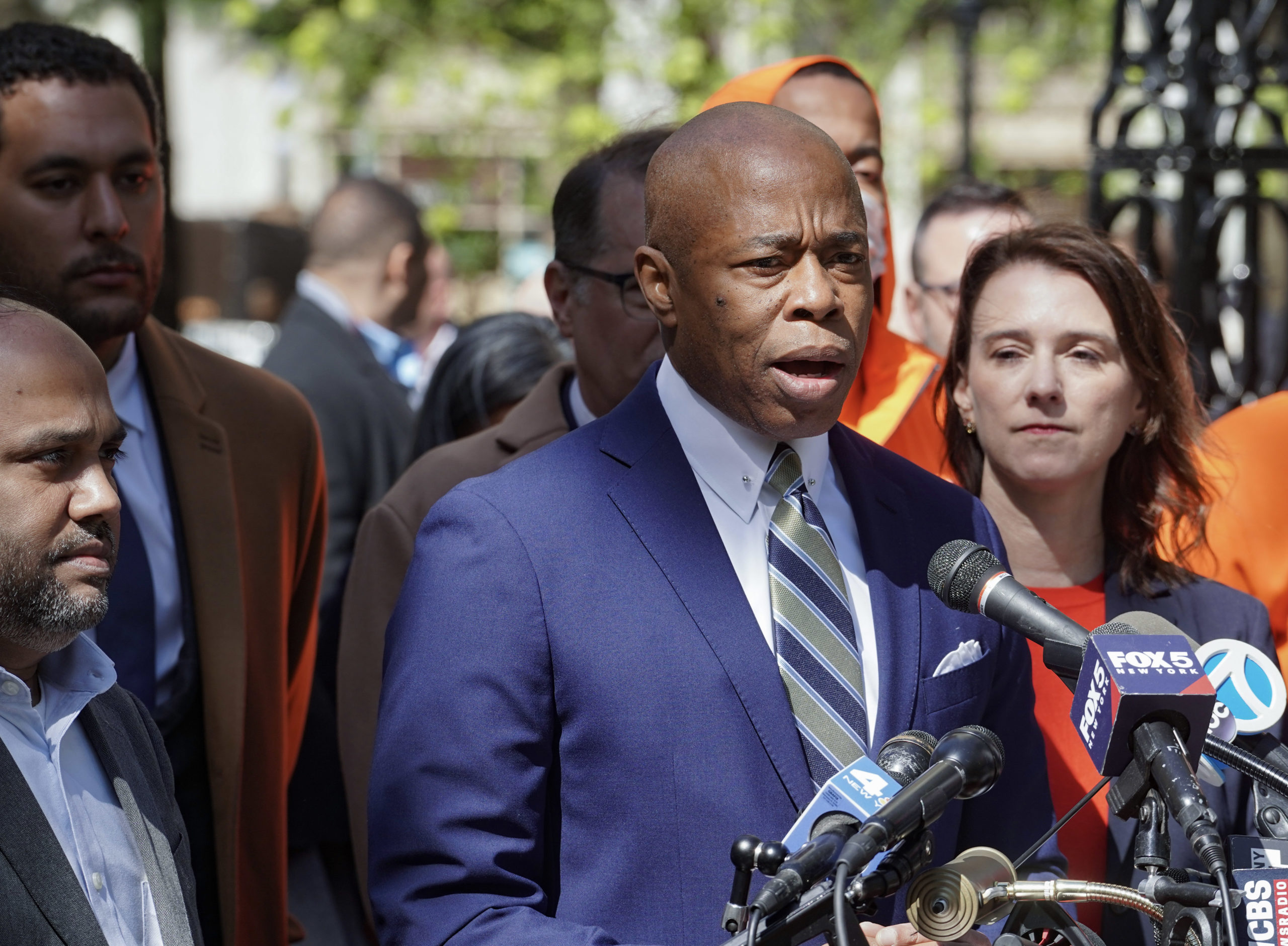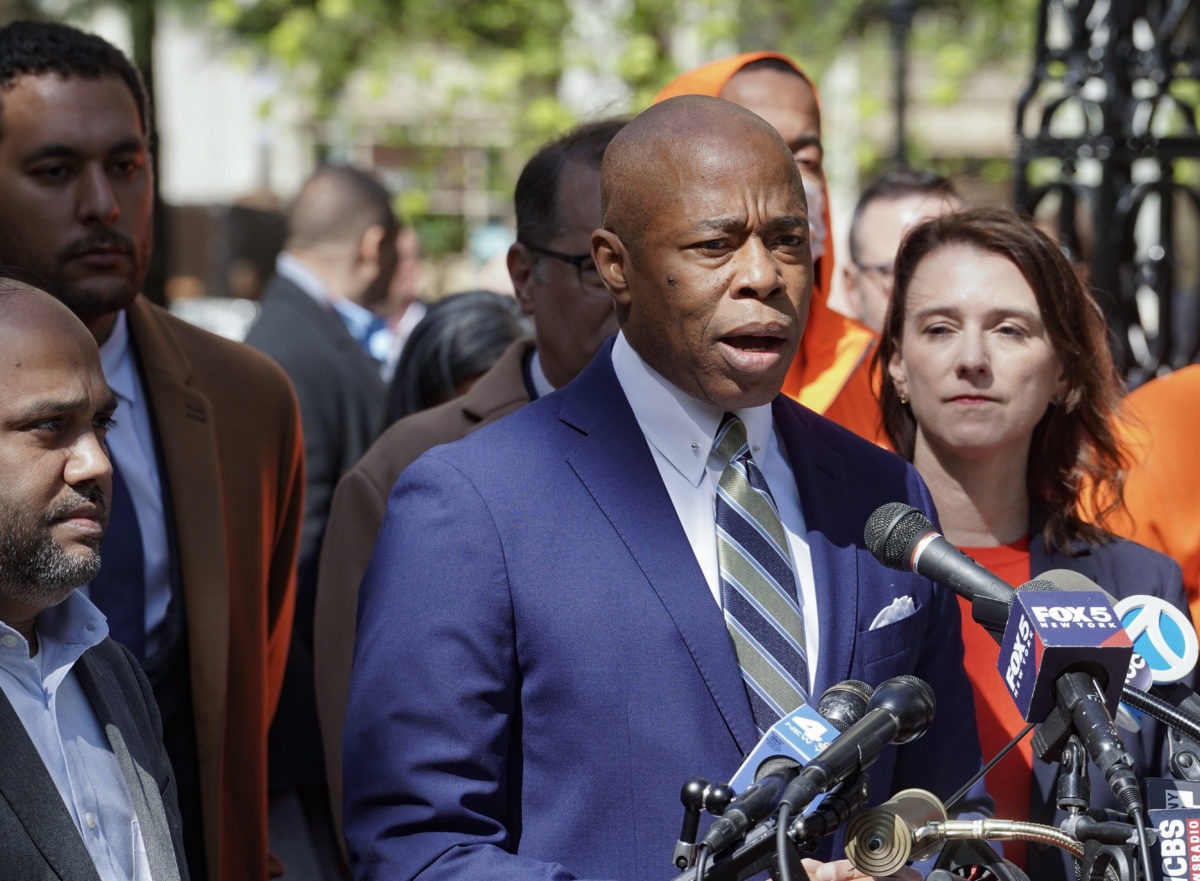Newsletter
Adams’ Forced Hospitalization Plan Will Have Lifelong Consequences
New York law can leave people who are involuntarily committed financially liable for their hospital bills and ambulance ride


Adams’ Forced Hospitalization Plan Will Have Lifelong Consequences
by Jerry Iannelli
In New York City last week, Mayor Eric Adams announced a new plan to sweep away visible homelessness and mental illness. The plan directs police and other officials to haul off the city’s most vulnerable residents to medical facilities against their will, where they will be evaluated for forced psychiatric treatment, including involuntary hospitalization. After making the announcement, Adams then flew away to sun himself in Greece and enjoy some World Cup festivities in Qatar. But while the mayor partied overseas, advocates for those were left to worry that Adams’ new “anti-homelessness” plan will leave people trapped in poverty and struggling with their mental health.
As The Appeal’s Elizabeth Weill-Greenberg wrote last week, advocates fear that the heavy involvement of police in these removal efforts is likely to end in violence and criminal charges. But the harms are unlikely to stop there. Involuntary psychiatric commitment often leads to the loss of access to basic rights and services, including employment, parenting, education, housing, professional licenses, or even potentially the right to drive, experts told The Appeal. People forced into treatment can also be hit with thousands of dollars in medical bills.
Rather than helping the homeless and mentally ill get back on their feet, Adams’ plan could further destabilize the very people it claims to help, warned Beth Haroules, a senior staff attorney with the New York Civil Liberties Union.
“At the end of the day, I would want government actors, when exercising police power, to be very cognizant of the collateral consequences of being involuntarily committed and exposed to involuntary treatment,” Haroules said. “The collateral consequences are very extreme and traumatizing—and can in fact prevent a person from recovering and participating in society.”
Adams’ November 28 directive authorizes officers with the NYPD and city Department of Health and Mental Hygiene to forcibly shuttle people “experiencing severe mental illness” from the city’s streets and subways and into hospitals for psychiatric evaluation. Like similar statutes in all 50 states, New York’s “Mental Hygiene” laws allows loved ones, medical professionals, certain state officials, and some nonprofit employees to force people into inpatient psychiatric hospitalizations or “assisted outpatient treatment,” by which courts can compel a person into a medication regimen, regular doctor visits, or other mental health treatments.
“These New Yorkers and hundreds of others like them are in urgent need of treatment, yet often refuse it when offered,” Adams said while announcing the policy. “The very nature of their illnesses keeps them from realizing they need intervention and support. Without that intervention, they remain lost and isolated from society, tormented by delusions and disordered thinking. They cycle in and out of hospitals and jails.”
Institutionalization can also violate someone’s civil rights. The involuntary commitment process is not a criminal proceeding, and individuals being evaluated for forced treatment do not gain the right to an attorney from the city’s Mental Hygiene Legal Service until after they have been hospitalized. The state can hold a person for up to 72 hours in a hospital setting before any official decision about commitment. People who fail—or are accused of failing—to follow medical orders after completing treatment can be reinstitutionalized. Those who have been wrongfully committed must work not only to clear the aforementioned societal hurdles, but also to fix incorrect information placed on their medical records.
Experts also told The Appeal the vague criteria of Adams’ proposal may lead to police sweeping up far more people than the mayor has claimed.
“We’re talking about people who could be in school or people in a professional career who could be at risk of losing their professional licensing or employment later,” said Lewis Bossing, a senior staff attorney with the Bazelon Center for Mental Health Law. “Those could be people on a subway platform mumbling to themselves. It could be anybody really. It could be a parent, and then their ability to parent could be called into question. A lot of people could be swept up.”
Studies on the efficacy of psychiatric commitment are mixed: Some say forced hospitalization or mandatory outpatient treatment helps stabilize people who are otherwise too unwell to seek treatment. But critics of the process say its potential to create trauma and breed further mistrust of the system outweigh its positives—a 2022 literature review of studies on forced commitment did not find evidence the process was more effective than voluntary care, for example. Studies have also found that people of color are more likely to be forced into treatment or hospitalization than whites—including in New York. And, to make matters worse, the city’s mental health providers are already underfunded, understaffed, and unable to care for the number of people currently being fed into the system, according to a recent investigation by Crain’s New York Business.
The Bazelon Center recently released a four-page statement outlining the harm Adams’ plan could cause. Studies cited in the statement show that people who’ve been involuntarily committed are more likely to attempt suicide and that young people who’ve been institutionalized are less likely to seek help when they feel suicidal. The statement also noted that many unhoused people have been hospitalized before, but often prefer sleeping on the street due to “squalid and dangerous conditions” in the city’s homeless shelters and hospitals.
“When it comes to mental health treatment, there is no evidence that court-ordered involuntary treatment in hospitals is more effective than quality community-based treatment,” the Bazelon Center wrote.
While medical professionals continue to debate the efficacy of forced psychiatric treatment, what’s clearer are the significant social and economic burdens associated with civil commitment, all of which seem likely to weigh even more heavily on people who are already poor or unhoused.
Under state law, people who have been involuntarily hospitalized in non-criminal proceedings can be held financially liable for the costs of their commitment, including both hospital costs and charges for services like ambulance rides. While that debt can be waived or charged to Medicaid, the process is often byzantine, faulty, or may not cover a full bill.
Hospital bills that stem from institutionalization can balloon even more rapidly for those who have private insurance or do not qualify for Medicaid. Infamously, after former NYPD Officer Adrian Schoolcraft was wrongfully committed in 2009 by his fellow officers in retaliation for whistleblowing, the hospital charged him $7,185 for a stay that was foisted upon him against his will. And for those attempting to secure employment or housing, medical debt can impact their credit score and make it much harder to get back on their feet.
In a 2020 commentary piece in the American Journal of Psychiatry, psychiatrist Nathaniel Morris noted that hospitals have even sued formerly institutionalized people to collect medical debts. He warned that the burdensome costs of such treatment can push lower-income or indigent individuals into risky situations or illegal activity.
“Psychiatric patients’ vulnerability, combined with the coercive nature of involuntary care, could also foster outright exploitation,” Morris wrote.
But the costs of institutionalization can also extend far beyond a hospital bill. In a sign of the continued social stigma surrounding mental illness, former students sued Yale University last week for allegedly pressuring people with mental health issues to withdraw from the school. Federal standards state that people with certain psychiatric disorder histories can be disqualified from obtaining a commercial driver’s license. Those with histories of psychiatric hospitalization can be barred from obtaining medical or other professional licenses. People who may be placed under guardianship after being institutionalized also lose the right to vote.
Instead of ramping up forced hospitalization of people who are unhoused or mentally ill, experts like Bossing of the Bazelon Center said the mayor should invest in non-coercive methods of support, including permanent affordable housing, social services, and outreach programs.
“If we really wanted to help people meet their needs, we’d be really engaging them, and providing the housing and supportive services that they need,” Bossing said.
In the news
Kenneth Mejia ran for Los Angeles City controller decrying the bloated police budget. Teen Vogue’s Lexi McMenamin spoke with some of the organizers and volunteers who campaigned for him. “It’s gonna take a while for us to get there, but this campaign has proven that abolition is a winning strategy,” said Dannie Nunez. [Lexi McMenamin / Teen Vogue]
Hugh Ryan, author of The Women’s House of Detention: A Queer History of a Forgotten Prison, writes on the intersection between prison abolition and the LGBTQ+ rights movement. “Let’s tear down these monstrous warehouses of human misery and spend that money taking care of people instead,” Ryan writes. “Let’s acknowledge that our modern movement is rooted in abolition.” [Hugh Ryan / Lit Hub]
San Francisco’s Board of Supervisors has approved the use of police robots that can be used to “incapacitate, or disorient” people suspected of crimes. They’re not the first police department to “flirt with such a techno-dystopian future,” writes Jennifer Stavros. [Jennifer Stavros / Independent]
A judge has finally dismissed the murder charge against domestic violence survivor Tracy McCarter. [Victoria Law / The Nation]
This week Richard Reynolds’s trial against Connecticut corrections officials began. Reynolds is challenging his decades-long imprisonment in solitary confinement. Ken Krayeske / Twitter]
A Florida police chief resigned after she used her position to get out of a ticket during a traffic stop. [Associated Press]
ICYMI — from The Appeal
In 2016, Dallas police took the extraordinary step of mounting a bomb on a robot and using it to kill a mass shooting suspect. Now more police departments are following suit, with San Francisco officials approving such use of force by robots last week.
Advocates say putting police on the frontlines of efforts to force unhoused people into hospitals for involuntary treatment will put already vulnerable people at greater risk of brutality and criminal charges.
That’s all for this week. As always, feel free to leave us some feedback, and if you want to invest in the future of The Appeal, please donate now and your donation will be tripled here.
